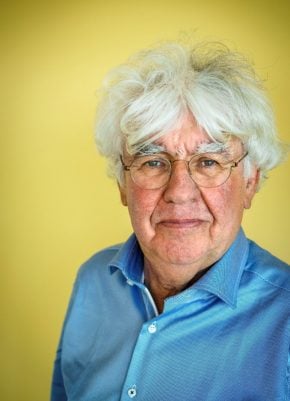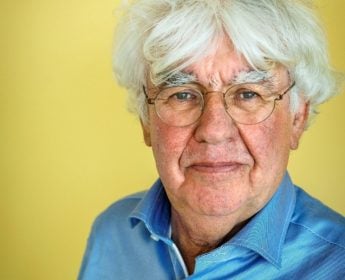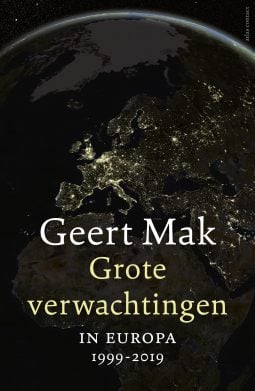

The Dream of Europe
The Dream of Europe is the long-awaited sequel to Geert Mak’s immensely successful In Europe (2004). While In Europe dealt with the 20th century, the past and how the major events of that, in many ways, horrific period marked by two world wars has shaped us, The Dream of Europe examines the first two decades of the 21st century, and picks up where In Europe ends: in 1999. Mak sketches the climate and the mood at the turn of the century, the optimism that reigned but vanished along the way, the sentiments surrounding the implementation of the euro, the consequences of the September 11 attacks, the situation in Eastern Europe and Russia, the financial crisis, the USA, northern versus southern Europe, and the refugees.
In 2020 an entirely updated Epilogue (Epiloog) has been published in which Geert Mak catches the corona virus in the act. This new Epilogue will be part of all forthcoming international editions of The Dream of Europe.

Biography
Geert Ludzer Mak (born 4 December 1946 in Vlaardingen, the Netherlands) is a Dutch journalist and nonfiction writer.
Geert Mak grew up in Leeuwarden as the youngest child of Dutch Reformed preacher Catrinus Mak and wife Geertje van der Molen. He studied law and sociology at the Vrije Universiteit Amsterdam and the University of Amsterdam. In 1973 he became a professor of constitutional and immigration law at Utrecht University. From 1975 to 1985, he was an editor at the weekly news magazine De Groene Amsterdammer, after which he worked for the foreign desk at the public broadcaster VPRO-Radio and the daily newspaper NRC Handelsblad, where he primarily focused on city and immigration issues.
During that same period, he was active among the group of journalists and authors who intended to breathe new life into what was then called literary nonfiction. In 1990, he was one of the cofounders of the literary nonfiction magazine Atlas—the forerunner of what would later become publishing house Atlas/Contact. Shortly thereafter, he made the decision to focus himself fully on writing. In doing so, he concentrated himself primarily on travel stories and historical nonfiction—or a combination of the two. Subjects such as the urban-rural divide, Europe and Amsterdam were connecting threads throughout his work. His books were translated into numerous languages.
Between 2000 and 2003 Mak fulfilled the role of extraordinary professor of urban issues at the University of Amsterdam, in what is known as the Wibaut Chair. For his achievements on behalf of the city of Amsterdam he received the IJ Award in 2002. He has twice been chosen as Dutch “Historian of the Year,” and has received honorary doctorates from both the Dutch Open University (2004) and the Wilhelms University in Münster (2014). For his book In Europe: Travels through the Twentieth Century he received the Leipziger Buchpreis zur Europäische Verständigung (2008) and the Otto von der Gablentz Prize (2009). The French government also awarded him the Chevalier de la Légion d’Honneur (2008). In the Netherlands, his exceptional engagement with international history has earned him the Golden Goose’s Feather (2015), the Comenius Prize (2016) and, from Dutch queen Maxima’s hands, the Prince Bernhard Cultural Fund Prize for his entire oeuvre (2017). In the statement that accompanied the honorary degree from Münster, Mak was dubbed a “gifted storyteller” capable of “combining hard science, popularization, originality and engagement.” Historians are generally cautious when judging Mak’s work. Herman von der Dunk, emeritus professor of history at Utrecht University, has said about Mak: “It is well-written, and historically correct, but it is not what I would call academic history. There is no analysis of historical development.” However, American historian John Lukacs has described him as “Europe’s portrait-painter, its impressionist, its poet-musician, the reader of its peoples’ minds.” In October 2021 Geert Mak will receive the Charlemagne Medal for European Media for his ‘essential contribution to the discussion of Europe’s role in the world’. The jury report states, among other things: ‘With his astute observations about the European continent, as described in In Europe and Great Expectations, he sketches a detailed history of the past thirty years as well as hopeful prospects in a time of extreme geopolitical change. In doing so, he makes an important contribution to the discussion of Europe’s role in the world and, at the same time, contributes to bringing people closer to the idea of a united European continent.’
Geert Mak is married to Mietsie Ruiters and divides his time between Amsterdam and the northern province of Friesland.
BOOKS
In 1992, Mak published The Angel of Amsterdam: Seven City Stories, his first foray into literary nonfiction: an anatomical lesson about the Dutch capital and at the same time a series of portraits of the city’s neighborhoods, streets, houses and inhabitants. Similar techniques—a combination of big history and small, human stories—were used in Amsterdam: A Brief Life in the City (1995) and Jorwerd: The Biography of a Village (1996), a now classic slow description of the rapid decline of European farming life that was awarded the Henriette Roland Holst Prize. In his most popular book, My Father’s Century (1999), Mak sketched the history of the Netherlands in the twentieth century on the basis of his own family history. In that period, he also published The City Palace (1997), The Land That Escaped (1998 Dutch Book Week essay) and The Summer of 1823 (2000, with Marita Mathijsen).
In 1999, to mark the end of the century, Mak spent an entire year crisscrossing Europe for NRC Handelsblad and published a travel report each day on its front page. It became the account of a journey through the continent as well as the twentieth century, one full of local observations and conversations with eyewitnesses. On that basis he published In Europe (2004), a book for which he received, among other prizes, the NS Reader’s Prize for best Dutch book and which was translated into more than fifteen languages. In the public debate Geert Mak has made a name for himself as a staunch defender of multiculturalism. In 2004, after Theo van Gogh’s murder, he published two pamphlets: Doomed to Vulnerability and, responding to his critics, Belated Message in a Bottle. In them, he took a swing at the “fear mongers,” urged caution and at the same time made a fierce plea for upholding the classic values of openness, freedom and tolerance. The essays caused the necessary commotion, in part due to the fact that Mak compared the methods of Van Gogh’s film Submission to the propaganda techniques used by Joseph Goebbels.
The Bridge: A Journey between Orient and Occident was published as the Dutch Book Week gift in 2007. It is a travel reportage that covers less than 500 meters: the Galata Bridge, which connects the traditional to the more modern sections of Istanbul, and on which Mak spent weeks sharing in the life of street vendors and passersby.
In America: Travels with Steinbeck (2012) can be considered the American counterpart of In Europe. In this book Geert Mak retraces, exactly half a century on, the footsteps of American writer John Steinbeck on his journey of discovery through the United States of the 1960s in Travels with Charley.
The city of Amsterdam once again plays a central role in The Many Lives of Jan Six (2016), the story of the noble family Six across four centuries of Amsterdam history—starting with one of Rembrandt’s best friends, the seventeenth-century Jan Six. In Europe would also receive a sequel. In The Dream of Europe, Mak picked up the thread in 1999 and described Europe’s most recent history, from the euphoria of the turn of the century to the crises of the 2010s and the coronavirus pandemic of 2020.
TELEVISION
In autumn of 2007, VPRO released a television adaptation of In Europe, in the form of a series spread across two seasons, 35 episodes in total, presented by Geert Mak. Partly based on The Dream of Europe, VPRO started airing a sequel to In Europe, counting 20 episodes in total, in 2019.
Geert Ludzer Mak (born 4 December 1946 in Vlaardingen, the Netherlands) is a Dutch journalist and nonfiction writer.
Geert Mak grew up in Leeuwarden as the youngest child of Dutch Reformed preacher Catrinus Mak and wife Geertje van der Molen. He studied law and sociology at the Vrije Universiteit Amsterdam and the University of Amsterdam. In 1973 he became a professor of constitutional and immigration law at Utrecht University. From 1975 to 1985, he was an editor at